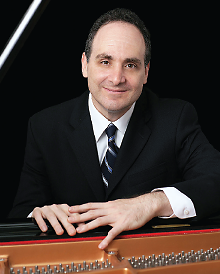Rachmaninoff on the Bill For Psychiatrist-Pianist
Abstract
Psychiatrist and concert pianist Richard Kogan, M.D., plans to give another lecture and mini-concert about a famous composer at the annual meeting. And this time it will include a psychiatrist and a happy ending.

Richard Kogan, M.D.: “Without the timely intervention of Dr. Nicolai Dahl, Rachmaninoff probably would have gone down as a little-known footnote in music history.”
Psychiatrist-concert pianist Richard Kogan, M.D., will once again present one of his highly popular lecture/mini concerts at the APA’s 2014 annual meeting in May.
Kogan’s specialty is giving an overview of the lives of great classical composers and how their psychiatric or psychological issues affected their creativity, then playing some music by the composers to illustrate his points. In this year’s program, he will focus on the Russian composer Sergei Rachmaninoff.
Actually, this is a story not just of Rachmaninoff, but of a psychiatrist named Nicolai Dahl, Kogan said during a recent interview. At a critical juncture in his career, when he was in his early 20s, Rachmaninoff fell into a severe depression; he had a commission to write a piano concerto, but was unable to write anything. He found his way to the office of Dahl, who had studied hypnosis with Charcot in France. Through a combination of hypnosis and psychotherapy, Dahl explored Rachmaninoff’s conflicts and challenges. At the end of four months, Rachmaninoff’s depressive symptoms subsided and so did his writer’s block.
“This is a wonderful illustration of how valuable psychiatrists can be to individuals who are in the throes of creative block,” said Kogan. “And the upshot is this: Rachmaninoff has gone down as one of the great all-around musicians of the 20th century—outstanding as a composer, pianist, and conductor. Were it not for the timely intervention of Dr. Nicolai Dahl, he probably would have gone down as a little-known footnote in music history.
“I am very excited about sharing this program with my psychiatric colleagues at the APA annual meeting, which will be in my hometown of New York City,” Kogan declared. “By the way, in 1917, after the Russian Revolution, Rachmaninoff fled his homeland of Russia. He settled in New York City and lived on West End Avenue. So that is another New York tie-in for the APA program.”
Aside from being a concert pianist, Kogan is a clinical professor of psychiatry at Weill Cornell Medical College and artistic director of the Weill Cornell Medical College Music and Medicine Program. ■
Kogan’s session will be held on Monday, May 5, from 12:30 p.m. to 2 p.m., in the Marriott Marquis Hotel, Astor Ballroom, seventh floor. At a previous annual meeting, Kogan discussed Beethoven. To see a video of part of the presentation, go to www.youtube.com/watch?v=PDNhzfcNJqQ



